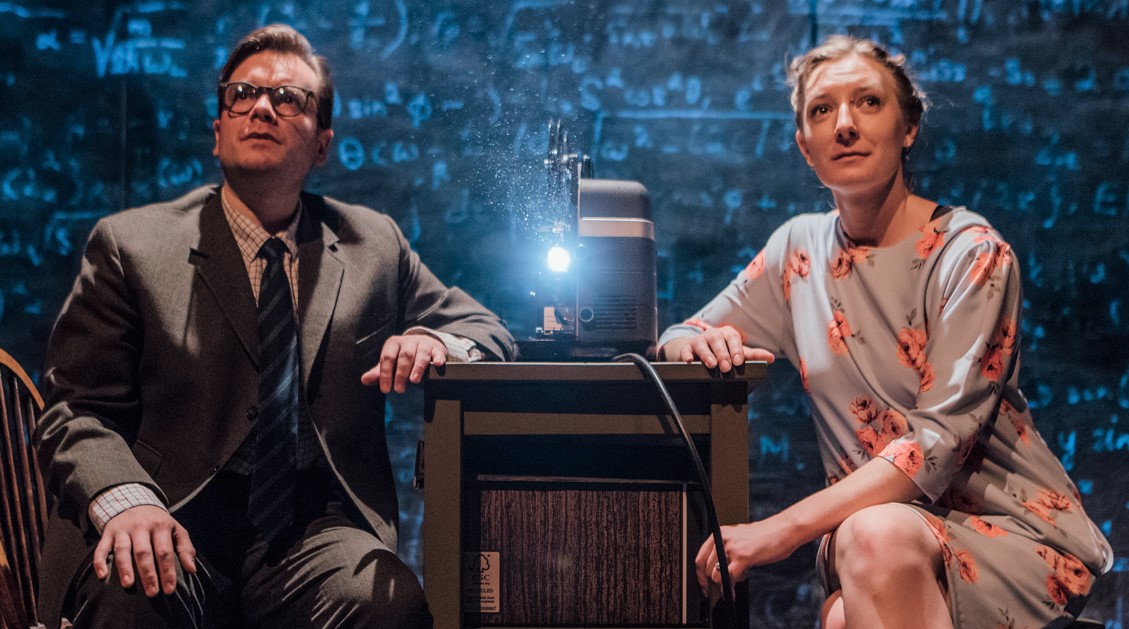Like the Scottish-American songwriter with the same name, British playwright David Byrne is concerned with life during wartime, and captivated by one of life’s great questions: “Well, how did I get here?” In this coolly cerebral and beautifully staged production of Secret Life of Humans, Byrne, who codirects with Kate Stanley, transports us through the present day, the 1940s and the 1970s, with pit stops at the dawn of humanity. He explores a one-night stand, a marriage abruptly ended and, of all things, the darkly ironic and secretive career path of real-life mathematician Jacob Bronowski. As fuel for the fire, Byrne pulls big ideas from historian Yuval Harari’s bestseller, Sapiens: A Brief History of Humankind, as well as Bronowski’s 1973 BBC series, The Ascent of Man.
Andrew Strafford-Baker as Jamie and Stella Taylor as Ava in Secret Life of Humans. Photo by Richard Davenport. Top: Richard Delaney and Olivia Hirst as Jacob and Rita Bronowski. Photo by David Monteith Hodge.
Fittingly, this science and morality lesson begins with a lecture to the audience. Ava (Stella Taylor), a research scientist, relays a humorous anecdote, involving a theatergoing dog, which employs language that hints at the lyrical analysis to follow: “We no longer see ourselves as animals. Even though we’re covered in the pencil markings of our past.” She then leads the audience in a simple hand exercise that reveals a tendon in the arm that is utterly useless, a prehistoric holdover from the days of walking with our forearms. It’s a smart bit of theatricality that entertains and instructs even as it opens the audience’s collective mind to the massive span of time that is under discussion. Sealing the deal, she points out that the act of watching her in a darkened theater is no great leap from our early ancestors appreciating a good night of cave painting.
Byrne enjoys switching lenses, going from macro topics to micro experiences and back again. Thus, Ava shrinks in scope from all-knowing to a woman on an awkward first date with Jamie (Andrew Strafford-Baker), a random dude she met on the dating app Tinder. In one of several magical flourishes, a potentially quotidien dinner scene is staged as if in fast-forward mode. Giving new meaning to the term waitstaff, servers and wine bottles rapidly appear and vanish, with zippy sound effects adding to the disorientation.
Jamie, it turns out, is Jacob Bronowski’s grandson, the ultimate turn-on for Ava. Conveniently, he has sole access to his deceased grandparent’s house, so off they go for a romp in the bedroom and, more fulfillingly for Ava, an exploration of the elder Bronowski’s personal history. More clever visual tricks ensue as Jacob (Richard Delaney) and his wife, Rita (Olivia Hirst), appear throughout the house like time-traveling ghosts, capable of vanishing behind a bookcase on cue. A trove of hidden files (which, in real life, were discovered by Bronowski’s daughter) reveals that long before his TV notoriety, Jacob served his country in World War II by helping to calculate saturation bombing techniques designed to maximize civilian deaths in Germany. Boom! The dangers of godlike behavior, another of Byrne’s themes, is explored here in flashbacks, as Jacob learns of his assignment with only a half-hearted pang of guilt, before reasoning himself into accepting the job alongside his colleague George (Andy McLeod), a man who, if sexually closeted, at least ultimately shows more regret than his cool-hearted cohort. Adding to his shame, Jacob constantly buries his heritage by demanding to be called Bruno, rather than Dr. Bronowski.
Delaney and Hirst with Andy McLeod (right) as George. Photo by David Monteith Hodge.
The cast, intact from the production’s 2017 premiere at the Edinburgh Festival Fringe, is a well-oiled machine. Jamie is more plot device than fully formed character, but Strafford-Baker is able to find the man’s charms. Taylor’s Ava is warm around the edges with a cool center, while Delaney’s Jacob is doggedly and dogmatically resistant against any emotional pull. Hirst’s Rita is poignant in remembering how she once drew Jacob in a pencil sketch (an echo of Ava’s “pencil markings of our past” lecture) and in her acceptance that Jacob’s early demise will translate into decades of loneliness. Her knowledge of her future self as well as Ava’s awareness that her university job will soon be taken away provide poetic contrast to Jacob’s sudden, unforeseen death in 1974.
“Every animal leaves traces of what it was; man alone leaves traces of what he created,” proclaimed Bronowski in The Ascent of Man. He says so again here (albeit with “man” replaced by the more politically correct “humans”). It’s a nod, by Byrne, to the craft of theater, as well as a fitting summation of Bronowski’s own life, the good and the arguably evil.
One of the final Brits Off Broadway productions of the season, Secret Life of Humans plays through July 1 at 59E59 Theaters (59 E. 59th St.) Evening performances are at 7 p.m. Tuesday through Sunday; matinees are Saturday and Sunday at 2 p.m. For tickets, call Ticket Central at 212-279-4200 or go online to 59e59.org.





